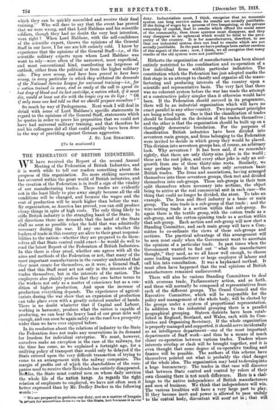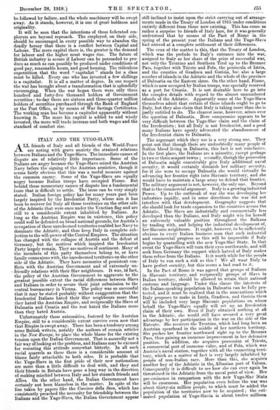THE FEDERATION OF BRITISH INDUSTRIES.
WE have received the Report of the second Annual Meeting of the Federation of British Industries, and it is worth while to tell our readers something about the progress of this organization. No more striking movement has occurred within the great world of British industries, and the creation of the Federation is in itself a sign of the vitality of our manufacturing trades. These trades are evidently not in the least likely to pine away simply because all the old conditions will be changed, and because the wages and the cost of production will be much higher than before the war.
By organization, as America has proved, you can still produce cheap things in spite of high costs. The only thing likely to stifle British industry is the strangling hand of the State. In all directions there are demands that the hand of the State shall as soon as possible relax the hold that was admittedly necessary during the war. If any one asks whether the leaders of trade in this country are alive to their great responsi- bilities to the nation—whether they are prepared to do them- selves all that State control could exact—he would do well to read the latest Report of the Federation of British Industries. In this there is clear proof, whether one agrees with all the aims and methods of the Federation or not, that many of the most important manufacturers in the country understand that they must create for themselves, as it were, a General Staff, and that this Staff must act not only in the interests of the trades themselves, but in the interests of the nation. The employers also plainly profess that they owe better terms to the workers not only as a matter of conscience but as a con- dition of higher production. And upon the increase of production everything depends. The experiences of agricul- turists during the war show that an expansion of production can take place even with a greatly reduced number of hands. There is no doubt whatever that if Capital and Labour, working in harmony, produce what the nation is capable of producing, we can bear the heavy load of our great debt well enough, and can soon be again safely on the road to a prosperity wider than we have ever enjoyed before.
In its resolution about the relations of industry to the State the Federation does not make any reservations in its demand for freedom for individual enterprise. We must, however, ourselves make an exception in the case of- the railways, for the time has come, as we explained a fortnight ago, for a unifying policy of transport that would only be delayed if the State entered upon the very difficult transaction of trying to come to an arrangement with the railway companies. The margin of profits out of which the shareholders of the com- panies used to receive their tividends has entirely disappeared. Belides, the State must .control men on whose daily services the whole life of the nation hangs. As regards the right relation of employers to employed, we have not often seen it better expressed than by Mr. Dudley Docker in the following words :— "‘ We are prepared to perform our duty, not as a matter of bargain. 'in return for somethina dnna to us by the State- but bartausa it ia aux duty. Industrialists must, I think, recognise that no economic system can long survive unless its results are socially justifiable. If the fixing of wages by a process of free bargaining, or the private ownership of capital, lead to results which offend the social sense of the community, then those systems must disappear, and they may disappear in an upheaval which would be fatal to the pros- perity of the country. It is for manufacturers, therefore, to see that our industrial system does not lead to results which are not socially justifiable. In the past we have perhaps been rather careless of this aspect of the case ; now, I think, we all recognize that many results of the old system were not justifiable."
Hitherto the organization of manufacturers has been almost entirely restricted to the combination and co-operation of a few individual firms within particular industries. The constitution which the Federation has just adopted marks the first stage in an attempt to classify and organize all the manu- facturing and producing interests of the country upon a scientific and representative basis. The very fact that there was no coherent system before the war has made the attempt at a constructive policy simpler than it otherwise would have been. If the Federation should succeed in its programme, there will be an industrial organization which will have no exact parallel in any other country. Two important principles are being acted upon. One is that the classification of trades should be founded on the decision of the trades themselves ; and the other is that the organization should be built up on a thoroughly democratic foundation. For the purposes of classification British industries have been divided into seventeen main groups, and firms belonging to the Federation were invited to decide in which group they would be placed. This division into seventeen groups has, of course, an arbitrary look. Why seventeen I It has been said, if we remember rightly, that there are only thirty-nine jokes in the world ; these are the root jokes, and every other joke is only an out- growth from one of these thirty-nine roots. Similarly, we may perhaps take it that there are only seventeen basic British trades. The firms and associations, having arranged themselves into these seventeen groups, then met and divided themselves into sub-groups. These sub-groups in their turn split themselves where necessary into sections, the object being to arrive at the real commercial unit in each case—the thing that could no longer be divided, the atom. To take an example. The Iron and Steel industry is a basic or main group. The wire trade is a sub-group of that trade ; and the wire-netting trade is a section within that sub-group. So strain there is the textile group, with the cotton trade as a sub-group, and the cotton-spinnmg trade as a section within that sub-group. Each section and sub-group will now elect a Standing Committee, and each main group will have a Com- mittee to co-ordinate the views of these sub-groups and sections. The practical advantage of this arrangement will be seen most easily when the Government want to ascertain the opinions of a particular trade. In past times when the Government wanted to find out "what the manufacturer thought," they used, as we all know well enough, to choose some leading manufacturer or large employer of labour and call him into consultation. It was a haphazard method. It must often have happened that the real opinions of British manufacturers remained undiscovered.
There will also be various Standing Committees to deal with overseas trade, Parliamentary action, and so forth. and these will normally be composed of representatives from each of the different groups. The Grand Council and the Executive Committee, which will be responsible for the policy and management of the whole body, will be elected by the groups under a system of proportional representation. In addition to the industrial grouping there is a parallel geographical grouping. Sixteen districts have been estab- lished in England, Scotland, and Wales, each with its Com- mittee and Organizing Secretary. If the whole organization is properly managed and supported, it should serve incidentally as an intelligence department—one of the most important departments of Staff work—and thus be a means of much closer co-operation between various trades. Traders whose interests overlap or clash will be brought together, and it is even thought that some degree of co-operative trading and finance will be possible. The authors of this scheme have themselves pointed out what is probably the chief danger of the Whole idea. The organization may tend to develop into a huge bureaucracy. The trades in that case will discover that between State control and control by rulers of their own choosing there is not much difference. Here is a chal- lenge to the native independence of British manufacturers and men of business. We think that independence will win. The various localities will have a very large part to play. If they become inert and power is allowed to pass unduly to the central body, discontent will soon* set in ; that will be followed by failure, and the whole machinery will be swept away. As it stands, however, it is one of great boldness and originality.
It will be seen that the intentions of these federated em- ployers are beyond reproach. The employed, on their side, should be encouraged in every possible way to abandon the deadly heresy that there is a conflict between Capital and Labour. The more capital there is, the greater is the demand for labour and the higher must wages rise. The future of British industry is secure if Labour can be persuaded to pro- duce as much as can possibly be produced under conditions of good pay, reasonable hours, and good housing. The ridiculous superstition that the word " capitalist " stands for a class must be killed. Every one who has invested a few shillings is a capitalist. It is all a matter of degree. In one respect the war has brought about a transformation that is splendidly encouraging. When the war began there were only three hundred and forty-five thousand holders of Government securities ; to-day there are sixteen and three-quarter million holders of securities purchased through the Bank of England or the Post Office, or by means of War Savings Certificates. The working man has become a capitalist apparently without knowing it. The more his capital is added to and wisely invested the more will trade increase and both wages and the standard of comfort rise.



























 Previous page
Previous page